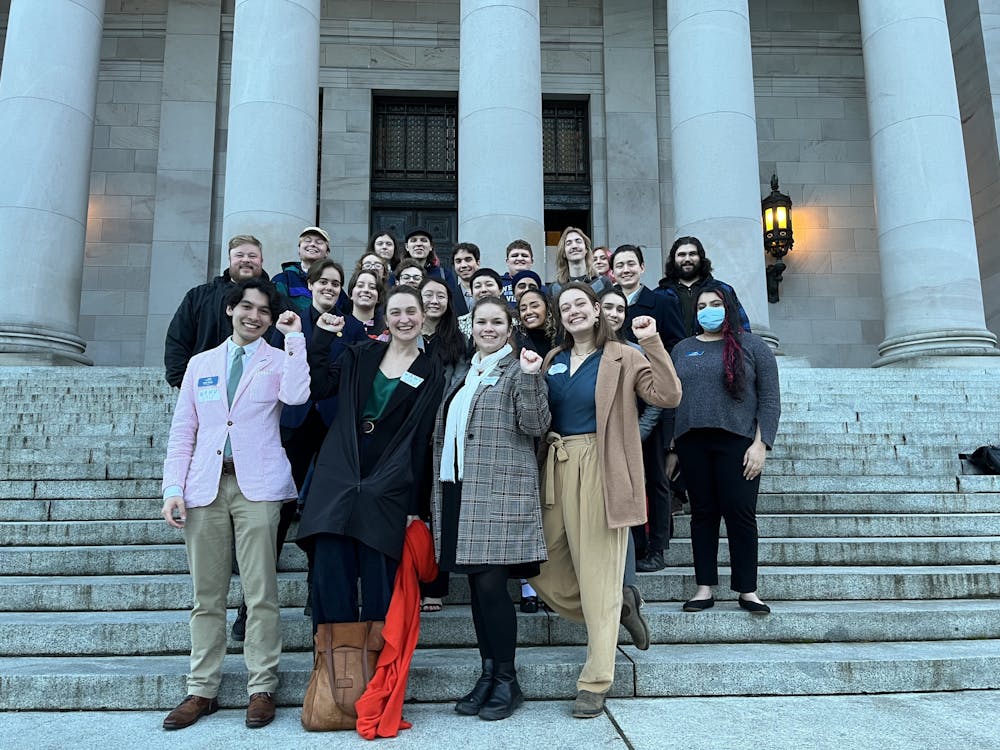On Dec. 2, 2022, Western Academic Workers United filed for recognition with the Washington State Public Employment Relations Commission and delivered a letter requesting recognition as a union and to begin bargaining with Western.
Since then, WAWU has had both success and challenges trying to get their demands met.
Lexy Aydelotte is a teaching assistant in Western’s history department and has been heavily involved in organizing efforts for WAWU.
Aydelotte said WAWU received letters of support from union organizations such as the Public School Employees, the Washington Federation of State Employees and the United Faculty of Western Washington. Due to the widespread support across campus, Western responded relatively quickly to WAWU. Aydelotte said other union campaigns have sometimes taken months to receive a response.
“Essentially Western’s response was, there’s no law forcing us to bargain with you, so we’re not going to,” Aydelotte said. “That seems like a clear problem that one, Western has to be forced to listen to and address students and their employees' concerns, and two, that there isn’t a law that says Western has to listen to us.”
Current laws require collective bargaining by academic student employees at state schools, like Washington State University and the University of Washington but not at regional schools like Western Washington University, Central Washington University, Eastern Washington University and Evergreen State College.
WAWU and multiple other student-employee unions at universities across the country are affiliated with the United Auto Workers, who have been a leader in academic organization at the University of California system since the 90s.
WAWU has been working alongside students at other regional universities and United Auto Workers to draft Senate Bill 5238 and House Bill 1219, which will grant collective bargaining rights for employees enrolled in academic programs at regional universities in Washington.
On Jan. 23 at the Senate hearing, 176 people signed pro. At the House hearing on Jan. 25, 234 people signed pro. Students from the regional universities testified at both hearings.
Aurora Brinkman is a TA in the psychology department at WSU and is an organizer for the Coalition of Academic Student Employees at WSU. Brinkman got involved with WSU-CASE/UAW after being introduced to the unionization effort by a friend and seeing the positive impact it could have on student employees.
“We were able to get recognized as a collective bargaining unit through the law once we got certified and recognized as a union,” Brinkman said. “That status of being certified as a union means that the university is obligated to bargain with us and that we bargain with each other in good faith as equals, which is not how it is without a union. The other regional universities don’t have that same right.”
WSU-CASE/UAW was officially certified in November 2022, but they’ve had issues trying to work with the university even though WSU is now obligated to do so.
“We have not been able to bargain with WSU yet, so we’ve been stuck trying to schedule a meeting for three months with them,” Brinkman said. “There has been some nonresponsiveness and very delayed responses in what seems to be delay tactics happening. So we’re currently in this period of limbo as we try to get a first meeting scheduled.”
Andrea Wooley has been a TA in the physics department at Western since fall of 2020. Wooley got involved with WAWU when she was approached by WAWU organizers while tabling at a Western info fair. Later that day, she attended a WAWU monthly meeting and spoke about her experience working as a TA.
Wooley said the training to become a TA was very minimal and everything was on Zoom due to COVID-19, so she felt isolated. The union has helped her connect with others that are feeling the same.
“When I started as a TA, I was struggling with certain things, and it was surprising to see that people in other departments were also struggling,” Wooley said. “That realization that there is a network of [student employees] going through the same thing has connected the dots and built a support system.”
Wooley has helped organize efforts to expand WAWU’s reach. She organizes meetings with student employees within the physics department to connect with each other and discuss their priorities. She said by getting involved with the union she’s learned skills that will help her in graduate school and in the future.
WAWU holds monthly meetings that are open to all, and those interested in keeping up with their efforts can connect with them through Instagram or their website.
“I want Western students to know that they do have power, and they can make a difference,” Aydelotte said. “Our goals are part of an ongoing conversation, and we want more voices. We want everyone to be heard.”
Ciarra Shaffer (she/her) is a city life reporter for The Front. She is a junior majoring in the public relations track of the journalism department. In her free time, Ciarra enjoys being outside and going to concerts. You can reach her at ciarrashaffer.thefront@gmail.com






